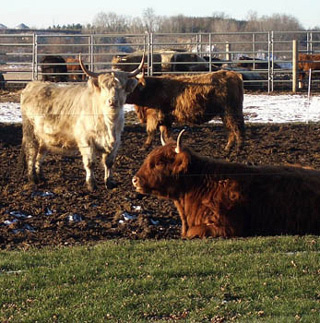-

-
Courses
Find courses by:
Collections
Cross-Disciplinary Topic Lists
- About
- Donate
- Featured Sites

Essays exploring the links among farming methods, ecology, food quality and human health have focused increased public attention on our food supply. These grass-fed Highland cattle are on a sustainable farm in Wisconsin. (Photo courtesy of pixn8tr.)
Dr. Karen Boiko
21W.777
Spring 2008
Undergraduate
Did Ben Franklin really fly that kite? What are the ethical dimensions of the creation of chimeras—and what should the public know in order to take part in the conversation about them? Is the science of nutrition really science? How did the technology of birth control end up in the delivery system that we know as "the pill"? Is it possible to time travel—and why would scientists even spend time thinking about it? In this class we celebrate, analyze and practice the art of writing about science for the general public. We read and write humanities-style essays about the intersections among science, technology, and life. Students draw on their own interests and ideas to write essays of substance and grace that focus on science and technology.
We'll read models of a variety of approaches to the science essay, including essays by Alan Lightman, Malcolm Gladwell, Elizabeth Kolbert, Oliver Sacks and others, noting in particular how they bring scientific ideas to life for readers. Topics for discussion will include the challenge of explaining scientific concepts; the "personal realm" (Kanigel) of science; myth vs. science; fairness and objectivity in scientific writing; and the "non-quantifiable considerations" (Collini) that are necessarily part of conversations about science. Students will write 5 essays, revising 4 of them, and polishing (re-revising). The class will also have a service learning component, in which MIT students work with a local high school class. Note: this is not a technical writing class.
Boiko, Karen. 21W.777 The Science Essay, Spring 2008. (MIT OpenCourseWare: Massachusetts Institute of Technology), http://ocw.mit.edu/courses/writing-and-humanistic-studies/21w-777-the-science-essay-spring-2008 (Accessed). License: Creative Commons BY-NC-SA
For more information about using these materials and the Creative Commons license, see our Terms of Use.
